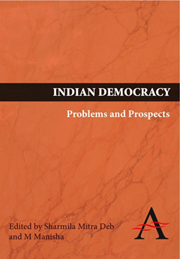Book contents
- Frontmatter
- Contents
- List of Contributors
- PREFACE
- Introduction DEMOCRATIC POLITICS IN INDIA: CONCEPTS, CHALLENGES AND DEBATES
- 1 RECONSTRUCTING DEMOCRATIC CONCERNS IN INDIA
- 2 ARE WE READY FOR DEMOCRACY? A FEW OBSERVATIONS
- 3 DEMOCRACY AND POVERTY IN INDIA
- 4 DEMOCRACY AND FEDERALISM IN INDIA: TWO EPISODES AND A SET OF QUESTIONS
- 5 INDIA'S COALITION FUTURE?
- 6 HOW DEMOCRATIC IS OUR PARLIAMENT? ELITE REPRESENTATION AND FUNCTIONAL EFFICIENCY OF LOK SABHA
- 7 DEMOCRACY'S JANUS FACE: A REVIEW OF ELECTIONS IN POST-INDEPENDENCE INDIA
- 8 THE NATURE OF THE OPPOSITION IN INDIA'S PARLIAMENTARY DEMOCRACY
- 9 RESTYLING DEMOCRACY? MAINSTREAM MEDIA AND PUBLIC SPACE VIS-À-VIS INDIAN TELEVISION
- 10 THE POOR WORKING WOMEN: THE ACHILLES HEEL OF INDIAN DEMOCRACY – A PROFILE OF THE MAIDSERVANT FROM THE BUSTEES OF KOLKATA
- 11 HOW IS DEMOCRACY IN SOUTH ASIA? A COMPARISON OF THE ELITE AND THE MASS ATTITUDES
7 - DEMOCRACY'S JANUS FACE: A REVIEW OF ELECTIONS IN POST-INDEPENDENCE INDIA
Published online by Cambridge University Press: 05 March 2012
- Frontmatter
- Contents
- List of Contributors
- PREFACE
- Introduction DEMOCRATIC POLITICS IN INDIA: CONCEPTS, CHALLENGES AND DEBATES
- 1 RECONSTRUCTING DEMOCRATIC CONCERNS IN INDIA
- 2 ARE WE READY FOR DEMOCRACY? A FEW OBSERVATIONS
- 3 DEMOCRACY AND POVERTY IN INDIA
- 4 DEMOCRACY AND FEDERALISM IN INDIA: TWO EPISODES AND A SET OF QUESTIONS
- 5 INDIA'S COALITION FUTURE?
- 6 HOW DEMOCRATIC IS OUR PARLIAMENT? ELITE REPRESENTATION AND FUNCTIONAL EFFICIENCY OF LOK SABHA
- 7 DEMOCRACY'S JANUS FACE: A REVIEW OF ELECTIONS IN POST-INDEPENDENCE INDIA
- 8 THE NATURE OF THE OPPOSITION IN INDIA'S PARLIAMENTARY DEMOCRACY
- 9 RESTYLING DEMOCRACY? MAINSTREAM MEDIA AND PUBLIC SPACE VIS-À-VIS INDIAN TELEVISION
- 10 THE POOR WORKING WOMEN: THE ACHILLES HEEL OF INDIAN DEMOCRACY – A PROFILE OF THE MAIDSERVANT FROM THE BUSTEES OF KOLKATA
- 11 HOW IS DEMOCRACY IN SOUTH ASIA? A COMPARISON OF THE ELITE AND THE MASS ATTITUDES
Summary
Elections in large-sized states are universally accepted as the watchword of democracy. A country that does not hold periodic elections and removes its rulers from power through the instrumentality of elections based on universal adult franchise does not qualify as democratic under the present circumstances. The paper argues that the institution of elections – widely held as the lifeblood of democracy under modern conditions whether in India or elsewhere – is produced through what Giorgio Agamben calls ‘a state of exception’ while paradoxically ‘safeguarding’ it. As he puts it:
Far from being a response to a normative lacuna, the state of exception appears as the opening of a fictitious lacuna in the order for the purpose of safeguarding the existence of the norm and its applicability to the normal situation. The lacuna is not within the law (la legge) but concerns its relation to reality, the very possibility of its application.
Viewed in this light, it is a study not so much of elections being the illuminated face of our democracy but of the dark face that is hidden by it. Yet the very suspension of electoral rules and norms makes the conduct of ‘normal’ elections possible, gives credence to them as an institution and thereby strengthens the foundations of our democracy. The term ‘suspension’ is used here in three relatively distinguishable senses of the sovereign state deciding first not to apply the laws, rules and norms that it has otherwise set for itself, second, to apply them in a way that infringes on what Montesquieu calls, the ‘spirit’ of laws and third, that disarticulates the moral community.
- Type
- Chapter
- Information
- Indian DemocracyProblems and Prospects, pp. 90 - 106Publisher: Anthem PressPrint publication year: 2009

